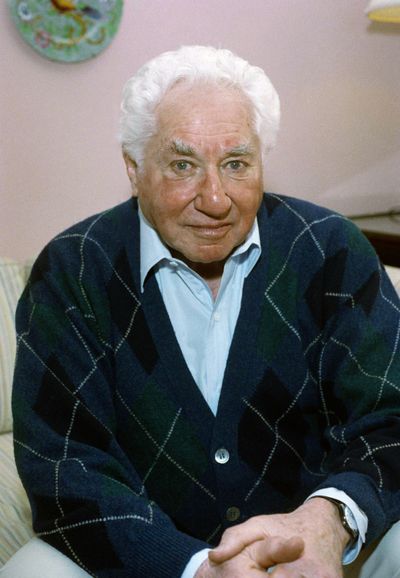Movie writing legend dies at 95

Budd Schulberg, an Academy Award-winning screenwriter who wrote about corrosive ambition and power in “On the Waterfront” and “A Face in the Crowd” and in best-selling books such as “What Makes Sammy Run?,” died Wednesday at his home in Westhampton, N.Y. He was 95.
Schulberg was the son of a legendary Hollywood producer whose fortunes rose and fell dramatically. As a result, he once said he was intrigued by “how suddenly (people) go up, and how quickly they go down.”
He used his insider knowledge of Hollywood politics to write his first novel, “What Makes Sammy Run?,” in 1941. A grotesque account of vice being rewarded, the book was widely praised (though not in Hollywood) and made him a star author at 27.
Vivid, crackling dialogue was his hallmark in about 10 other books and a handful of riveting films. He wrote the memorable speech that included the line “I coulda been a contender,” spoken by actor Marlon Brando in “On the Waterfront” (1954).
Schulberg’s next project, “A Face in the Crowd” (1957), skewered the television industry and became a lasting favorite of critics and moviemakers.
Schulberg’s fascination with ambition found a consistent theme in boxing in his films, books and short stories.
Legendary boxer Gene Tunney rated Schulberg’s 1947 novel “The Harder They Fall” among the best fictional accounts of boxing.
Like Glick, Schulberg had working knowledge of the movie business; he was the son of Paramount studio head B.P. Schulberg. And like the “On the Waterfront” hero Malloy, who testifies about corruption on the docks, Schulberg informed on his peers.
In 1951, he named names as he acknowledged a communist past before the House Un-American Activities Committee, becoming one of Hollywood’s most prominent witnesses. He appeared voluntarily to acknowledge he had been a communist from 1936 to 1939. He claimed he was disillusioned by Stalin’s nonaggression pact with Hitler and quit the party when it tried to make him write “What Makes Sammy Run?” with a Marxist twist.